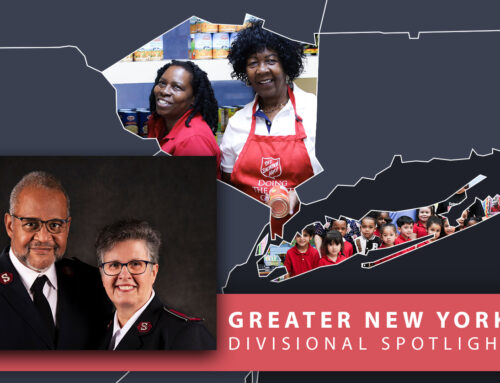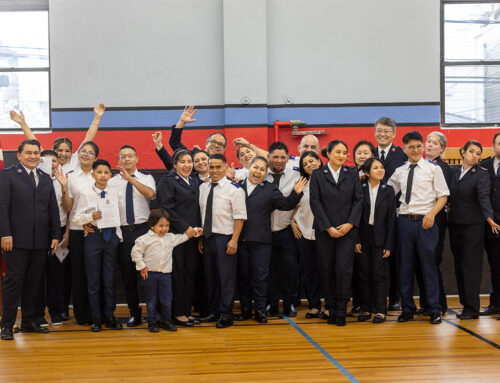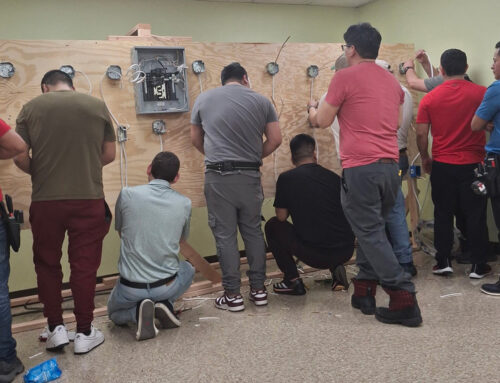The Army at the Scene: New York
by Hugo Bravo
This summer, I had the privilege to take part in The Salvation Army’s P.E.A.R.L Essence outreach to individuals in locations with an increased risk for human trafficking and exploitation in New York.
P.E.A.R.L (Purposed, Empowered, Appreciated, Respected, Loved) Essence takes a four-step approach to their ministry: presenting individuals with a gift as a gesture of kindness and value, informing them about and advocating for The Salvation Army’s first-step services, showing empathy to the women’s situation, and engaging them with prayer and God’s love to develop trust.
“When we started this ministry, we had a lot of questions as to how we should approach it,” says Major Margareta Ivarsson, command secretary for spiritual leadership development and social justice representative for The Salvation Army in the Greater New York Division. “Should we identify ourselves as The Salvation Army? Should our transportation vehicle have a shield on it? Do we ask to pray with these women while they work? But today, there is an Army shield on everything we bring, down to the pens we use to write down information while engaging the women.”
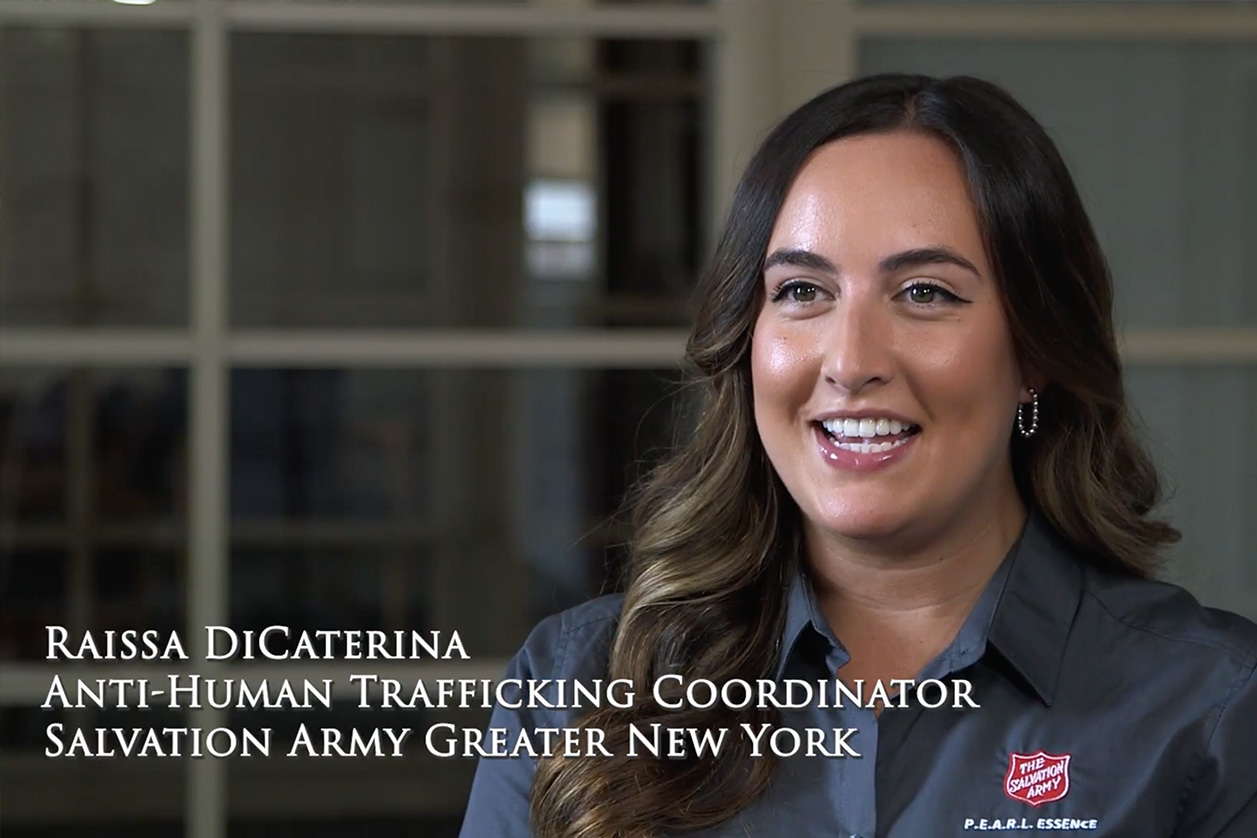
“We also wanted to get as many people involved as possible,” says Raissa Di Caterina, a mental health counselor and the anti–human trafficking response coordinator for the Greater New York Division. “However, we must act as gatekeepers. Someone who might not be properly trained could say or do something that could retraumatize a person we’re trying to help. We want everyone who comes along to be informed on what we do and how to benefit this outreach.”
“The Salvation Army has a unique role in the fight against human trafficking. When you become part of this ministry, you really get to see who you are as a Salvationist,” says Major Ivarsson.
One talks, one prays
For my first night with P.E.A.R.L Essence, I drove to a police station in East New York, Brooklyn, to meet with Raissa, trained P.E.A.R.L Essence volunteers, and Salvation Army pastors from Greater New York. At midnight, we all headed out together in a van. In a car behind us were police officers and anti–human trafficking representatives from the police station. They would communicate via radio with Raissa and our team, pointing out the best locations to find women to help and being our extra eyes on the streets.
Upon seeing an individual working on the streets, two P.E.A.R.L Essence members would step out to greet her. One would introduce themselves as part of The Salvation Army and offer a gift bag of flip-flops, wipes, snacks, lip balm, and information on local Army help services. The other would ask about the woman and whether they could pray with her. Meanwhile, waiting in the van, we took notes of her appearance, clothing, and any distinctive features. This would help P.E.A.R.L Essence remember and identify her to make better future connections, especially if she decided to visit a Salvation Army church for help. When the team members returned, they’d give us the woman’s name and prayer requests. A common request from women the team encounters is to pray for their children at home.
Between stops, Raissa explained how P.E.A.R.L Essence could distinguish the women who were new to the streets and those who were not. If a lady was wearing clean sneakers, it was a sign she had not been out for long. More revealing clothing, dirtier shoes, or high heels meant they were experienced. All the women followed certain rules: Stand on the street, not the sidewalk. Don’t deny anyone business. Don’t talk to another pimp besides your own.
I saw the pimps on foot and bike closely watching our van. They weren’t wearing flashy or baggy clothing or jewelry. They wore plain jeans, plaid shirts, and work boots and looked more like men coming home from a late factory shift than like traffickers of women. Among them was a man in a blue MTA worker jumpsuit. My immediate impression was that he was a city employee working nights. Major Arlene Di Caterina, corps officer at Queens Temple and our driver for the evening, said he was likely a pimp waiting for us to leave, noting how his gaze shifted from our car to the women working. We all wondered how he could have acquired an MTA outfit that made him blend in seamlessly on the streets.

“Our presence is even more needed now,” says Lieutenant Esther Mobley, corps officer at The Salvation Army Stapleton Corps in Long Island and a veteran of the P.E.A.R.L Essence ministry. “The pimps being out like this tells us that they know we’re having an effect on the women we speak to.”
One of the individuals that night not only accepted the gifts but also agreed to speak with the police officers behind us. She looked much younger than any other women P.E.A.R.L Essence had encountered, and now it was up to the police to take over. Later we learned that after giving them her information, she asked to be taken to a local fast-food restaurant, where she could be picked up by a friend.
“We don’t know what was said in conversation between that young lady and the police before she was taken away from that location,” says Lieutenant Mobley. “But as part of The Salvation Army, I know that transporting someone away from a bad place can be life changing. For a moment in time, her situation was interrupted with gifts, prayers, and a ride.
“I hope the Lord allows her to connect the dots. Not because we were there with cops, but because God will always provide an escape. The Lord used us to show that young lady a way out.”
Roosevelt Avenue
On my second assignment with P.E.A.R.L Essence, Raissa and I traveled with police officers and Ruoxi Chen from Garden of Hope, another local organization that serves and empowers adult and child victims of human trafficking. Unlike my first visit, this took place during daytime on Roosevelt Avenue in Queens, an area known for its large number of brothels masquerading as massage parlors and hair salons. The women working usually stand outside their places of business, approaching potential customers as they walk by.
Today’s gift bags were filled with necessities like toothbrushes, toothpaste, feminine hygiene products, and other supplies that someone new to the country might need. They also contained info in English, Spanish, Mandarin, and Polish about the Army’s housing assistance programs.
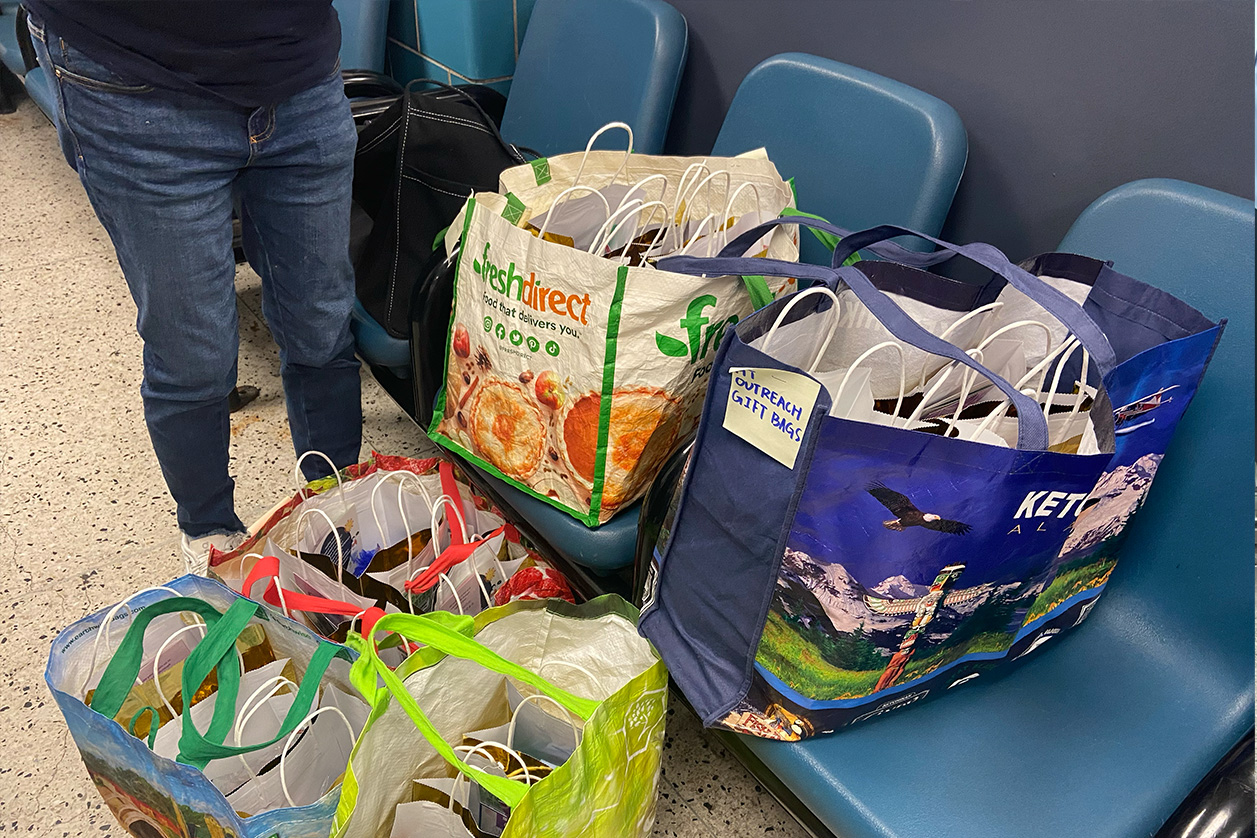
“Many of the women who work in these locations are forced to live upstairs or downstairs from their business. These individuals feel trapped, because their trafficker or pimp is usually the one providing them housing,” Raissa explained.
During the day, with police officers close by on foot, the team could engage in longer moments of prayer and ministry than at night. At the first stop, Raissa and Ruoxi (who speaks fluent Cantonese) were even let inside a parlor to share the gifts with the women who were not outside. One of the police officers waited with me a few feet away from the parlor door. He admitted that he always felt a little nervous for Raissa and her team when they were invited inside.
I was impressed by how the police were eager to be part of this ministry, to share their expertise and act as our personal guides to where P.E.A.R.L Essence is the most needed. By allowing The Salvation Army into their world, law enforcement has an ally in anti–human trafficking.
“The police we work with have hearts in this mission. They share their up-to-date information about different populations growing in numbers, and tips they’ve received from their connections on the streets,” says Raissa. “They trust us because P.E.A.R.L Essence is not just evangelism. We’re trained to work in these situations.
“And we share our resources with them too. If they need a Spanish-speaking social worker, we can send somebody. If they need last-minute housing to help a victim, we will have one ready for them.”
Working together
After my second day of P.E.A.R.L Essence ministry, I asked Raissa if she could see a way to permanently put a stop to human trafficking. I knew this was a loaded question. After I’d witnessed the number of women in East New York and on Roosevelt Avenue, the ministry seemed like a mission with no end. Are harsher penalties for the traffickers the solution, or for the “johns” who seek the services of these women? Or is it a stronger, better financed police presence?
“Right now, we’re doing a lot of good work directly with the police we know, but that’s only one approach,” says Raissa. “Other organizations, local governments, and even other law enforcement agencies may not agree with our approach. So right there, we’re clashing on ideas, and we’re not working together as well as we could be.
“Now throw in all the bureaucracy and political disagreements on where to provide resources. Do we send more cops to arrest the pimps, and when they do, how are we immediately protecting the victims? Is there funding for programs to help them flourish and rebuild their lives?
“There must be a comprehensive, same-page approach to all anti–human trafficking efforts. We can’t have anyone saying, ‘I’m going to do it my way and I don’t need anyone else.’”
I mentioned that it sounds like ending human trafficking needs to be approached the same way The Salvation Army responds to any need in the community: without discrimination of course, but also without a single group or individual giving all the instructions or taking all the credit for serving.
“It’s a big ask, but until that happens, it’s better to save one than none,” says Raissa. “Sometimes the work of P.E.A.R.L Essence can be daunting, because the need is so large. But like all ministry, if you have helped a single person, it’s always going to be worth it.”
For more information on P.E.A.R.L Essence, go to easternusa.salvationarmy.org/greater-new-york/pearl-essence

